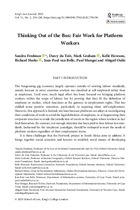| dc.description.abstract | The burgeoning gig economy largely operates outside of existing labour standards,
mainly because in most countries workers are classified as self-employed rather than
as employees. Until now, much legal effort has been focused on bringing platform
workers within the scope of labour law by proving that they fit the definition of
employee or worker, which functions as the gateway to employment rights. This has
yielded some positive outcomes, particularly in exposing sham self-employment.
However, this approach is limited, not least because platforms are adept at reconfiguring
their conditions of work to avoid the legal definition of employee, or at fragmenting their
corporate structure to evade the jurisdiction of courts in the region where workers in fact
find themselves. By contrast, not enough attention has been paid to how labour law standards,
fashioned for the ‘employee’ paradigm, should be reshaped to meet the needs of
platform workers regardless of their employment status. | en_US |

